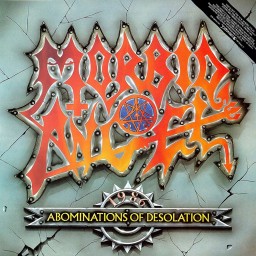 Review by Sonny for Morbid Angel - Abominations of Desolation (1991)
Review by Sonny for Morbid Angel - Abominations of Desolation (1991)
This was recorded in 1986 but was shelved by the band as they faced some lineup issues and were unhappy with the sound of the album. It was heavily bootlegged but eventually was cleaned up and given an official release by Earache in 1991 and this is the version I have been listening to. It's got to be said that this seems to raise the bar as far as metal extremity went in 1986 and you can't help but wonder if the argument about the first death metal album would have been well and truly been settled if it was put out at the time of recording. The riffs here sound like something beyond the ultra-aggressive thrash metal that was being produced by the most extreme bands at this time and more like a whole new thing entirely, Trey Azagthoth proving that from the very get-go he was ahead of the curve when it came to writing death metal riffs. In fact the riffing and the solos are the major draw for me here, their sheer brilliance somewhat overshadowing the other aspects of the album. Lyrically Morbid Angel looked to the Necronomicon for inspiration and consequently the lyrics are very much occult-centric. As many other commentators have pointed out, the weak point is drummer / vocalist Mike Browning and his performance behind both kit and mic may well be the reason that Abominations of Desolation was shelved (and his leaving the band, although an altercation with Trey over a girl is also cited as the reason for the latter).
To choose to shelve the album was a brave move really when you think about it, after having put the effort into producing a debut record, then holding off until they considered themselves better placed to produce a worthwhile release must have taken a great deal of discipline. Rather than just wanting to see their name on a record sleeve they took the conscious decision to wait and that must be applauded as it shows a band willing to go the extra mile to get across their true vision rather than settling for less. Most of the tracks here (all except for Demon Seed I believe) have been reworked and released on later albums, proving that they never felt the material itself was weak, but rather it didn't come across as they had envisioned in this form. On the whole, I would say this is not merely a release of historical importance in the emergent death metal scene of the 1980s, but is a decent release in it's own right and the perceived weaknesses aren't complete deal breakers for me, as the material and guitar work is still strong enough to give the recording value.
